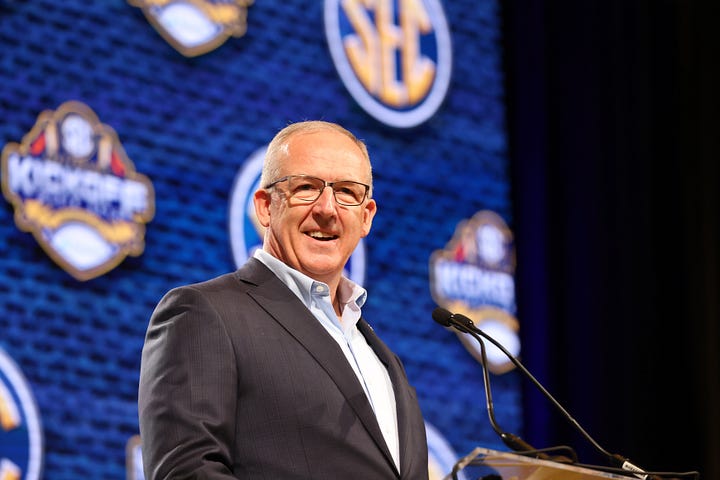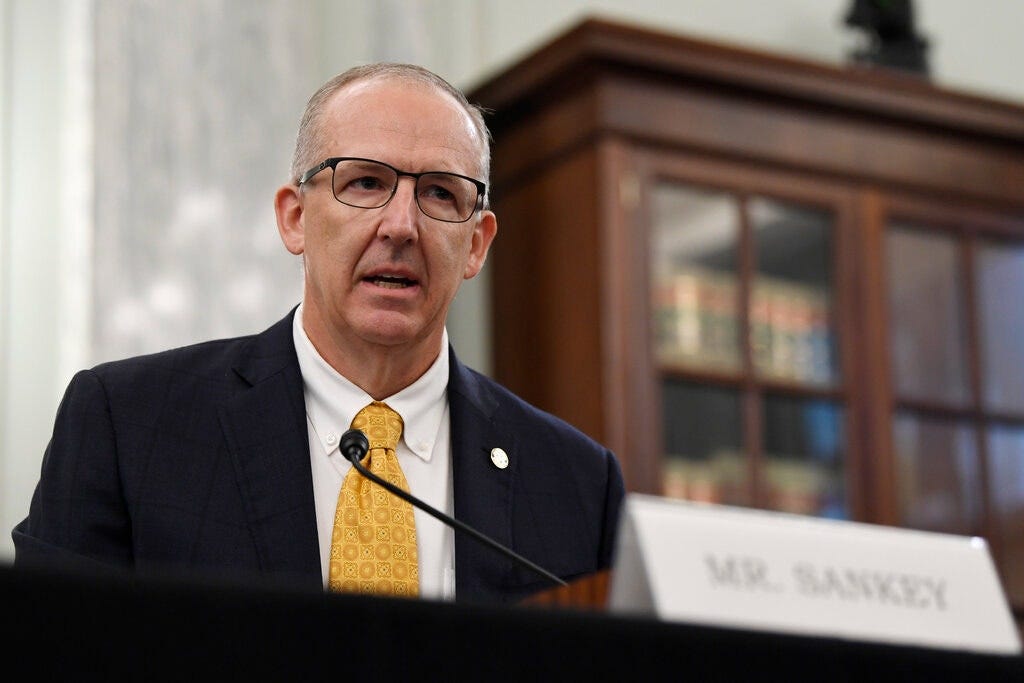Canzano: 1-on-1 with SEC Commissioner Greg Sankey
The fall of the Pac-12, CFP future, NCAA Tournament... and more
Greg Sankey is the commissioner of the Southeastern Conference. He’s the longest-tenured “Power 5” commissioner and one of the most powerful voices in college athletics.
I sat down with Sankey on Friday for a candid and lengthy 1-on-1 discussion about the landscape of college athletics, the future of the College Football Playoff, and the NCAA Tournament.
We spoke about Nick Saban’s retirement at Alabama, the downfall of the Pac-12, the suggestion that football should break away from other sports, and discussed how college football is different than the NFL.
It still is, right?
Sankey on whether the fall of the Pac-12 Conference and market consolidation was inevitable:
It’s easier to Monday-morning quarterback and we’re all making judgments in real time. I have the benefit of knowing people and hearing things and having a responsibility to track. I knew there were some turbulent waters, but I expressed at the time last summer… it’s disappointing to see. I never thought the type of consolidation was inevitable. I think everyone involved had opportunities to avoid what’s happened, but again that’s Monday-morning quarterbacking. You respect that people made judgments in real-time. Now we’re going to have to turn the page in real-time and go forward.
On Washington State president Kirk Schulz proposing that the Pac-12 be treated as a “Power 5” member in the College Football Playoff:
We spent four years trying to deal with a format expansion, one that the SEC did not request, did not advocate to pursue, but worked as a good partner and collaborator to find a new way. Over those four years, everything in college sports has been touched by change, whether it’s the COVID year, conference membership, NIL activity, litigation, NCAA changes, Charlie Baker’s project… I could go on and on.
The reality is that we have to have a postseason system that adapts. I am not at all a fan of continuing requests from different corners for special accommodation. We have not asked for special accommodation to this point. We’ll see. It’s at the board level. It’s not to the commissioners. We’ve stated previously a view as a group. It wasn’t unanimous. But at some point, we’re going to have to adapt for the next two years. Then, we’re going to have to re-think our approach to how governance is conducted and how decisions are made if it is to work.
On what he listens to when he’s running or driving:
I will confess as we speak last night I attended a concert with Toto and Journey or at least their logos and what’s left of those bands. Now that I’m in the gray-hair group at rock concerts I hit snooze on the alarm.
When I do run, “Canzano & Wilner” is on my podcast list on a regular basis. In fact, there was a time last spring when you guys interviewed me, George (Kliavkoff), and a number of other conference commissioners. I went back and replayed all of those. I was driving back from Athens, Georgia and it’s interesting to go back and look — and you probably do it — to kind of analyze what’s been said, what’s then happened, through a different lens. So I will do that from time to time on a run. I might grab a podcast from two years ago of someone that I intersect just to hear what they were thinking then and what it means now.
Sankey on why he re-listens to his interviews:
I self-scout in retrospect. I started doing that intentionally after visiting one time with a former speechwriter for President Clinton who was very complimentary of me in some ways and redirected how I communicate. I go back and listen to what I said and evaluate it.
On coaches such as Alabama’s Nick Saban retiring amid the changing industry:
I spoke when Jeremy Foley, a long-time athletic director at Florida, was stepping down. He asked me to come speak to the entire athletic department. The reality was that Jeremy Foley was always going to retire. Well, we put that thought aside because we don’t like to deal with change. Now, the reality in our society is change seems to be happening every day.
We like to think that Nick Saban is going to coach forever. Obviously, that was never the case. He made a decision. Do I think the environment contributes to that? I don’t know that it’s any one thing for anybody. There’s a lot that factors into the decision. You never want to make a life decision based on one life event. Nick — clearly — has had an incredible career. Has a family around him, has a life to live. I look forward to continuing to interact with him.
Others (who have retired) have likely been direct about the environment in college sports. I’ve spoken before these recent changes, well before to say: “OK, states, you’ve unleashed NIL activity. We now have courts weighing in on transfer policies. We should also be concerned we’re going to lose really effective leaders, good people, from the coaching profession.” And I think that’s a continuing concern that people look and say: “I just don’t know if I want to work in this environment. I’m going to go find another opportunity.”
I don’t know if that’s great for college sports.


On forming an advisory group that includes the SEC and Big Ten:
Big problems are not solved in big rooms filled with people. You have to narrow your focus a bit. There may be raised eyebrows. We certainly called in advance to communicate to colleagues what was going to be announced rather than do it in the shadows and have somebody report on it. You might as well put things out there.
It’s not expansive. It’s focused on dealing with some of the immediate issues. It helps to motivate ourselves in my opinion and if it helps to motivate other people to seek solutions and collaborate more effectively, so be it. I do think both leagues feel the responsibility of leadership at this key time. And that really informed the announcement of the advisory group.
You’ll note we didn’t call it an “alliance.” We didn’t have Zoom calls. We didn’t create logos. We simply want the opportunity for a group of their leaders and a group of our leaders to talk about some of the elements of a path forward.
On whether college football should break away from other sports:
It’s much more complex than the interview line. I respect that people have that opinion. I look at it from our league’s standpoint in the SEC. Usually, that kind of comment is followed by ‘‘other sports can go schedule regionally.” There’s where I kind of raise my hand and wave it and say: “I don’t know if you’ve looked at how we’ve made decisions. We’ve maintained a regionality. We’ve built upon that regionality in a special way.”
For our league, I’m going to look over our last year. We’ve had the No. 1 NFL Draft pick, the No. 1 men’s basketball collegiate athlete chosen, the No. 1 draft pick for the WNBA, the No. 1 and 2 draft pick in Major League Baseball. We had the United States Men’s Amateur (golf) champion, the United States Women’s Amateur champion. We had Nick Dunlap, an amateur, win a PGA event for the first time since Phil Mickelson. We’re going to feed Olympian medalists into Paris this year out of this league. I think it’s difficult to look a football player in the eye and say: “We can do A, B and C for you, but all you high-level achievers (in other sports) we can’t do that for you because we’re in a different system.”
I look at this as a holistic endeavor. Our football programs exist as part of our universities. They exist as part of our athletic programs. And maybe I’m a dinosaur but I actually think we should remain connected as programs and as athletic programs to our university and not simply break out sports.
On the reports of a six-year, $7.8 billion extension between ESPN and the College Football Playoff:
Let’s be clear — that’s one of those ‘sources say’ articles. I have a great relationship with ESPN. Their interest is important, but the entirety of the College Football Playoff still has work to do.
On whether CFP games will be streamed (and behind a paywall) like the NFL playoffs:
That’s part of the “work still to be done.” Embedded in that is, certainly with all of the new players in the environment, that new media opportunity has been part of the consideration.
On the differences between college football and the NFL:
There is a clear distinction still between college football and the NFL game. The intensity in our stadiums on a Saturday early afternoon, late afternoon or evening is unmatched. NFL games are exciting but they are clearly different.
I think there’s a reality that populated our football coaches’ meeting yesterday. Our football coaches talked about the distinctions between the NFL game and the college game. I’m one that thinks that needs to remain.
I’m not familiar with NFL players having to go to class on Monday. There is that clear distinction. The size of our stadiums, the locations of many of our stadiums in these college towns vs. the nation’s top-50 media markets. And then the ability to draw people in, for us, when we pivot this fall to the ABC opportunities and more over-the-air games so people can experience that feel even from afar — all of that is part of the combination … college football should be distinct, it should develop people, it should help them reach the goal if they want to play in the NFL, but it should remain distinct from college football.
Sankey on potential expansion of the NCAA Tournament field:
I communicated interest in that almost a year and a half ago because I’d been in meetings — where over and over — people were fearful of things being taken away. We have some old systems in place that do contribute to the tournament but we’re leaving out highly qualified teams from a competitive basis… the way we allocate tournament berths some less-highly competitive teams are given bids and we exclude teams generally in that 40-55 range that are very, very competitive teams. My hope is that we can have a responsible look at tournament expansion. I’ve never put a number to that.
I appreciate all who read, subscribe, and share this independent endeavor with friends. If you’re not already a “paid” subscriber, please consider a subscription so you don’t miss a thing:
Consider a gift subscription for a friend or family member:



10 comments so far and 100% negative about this guy. Make it 11/11. One of the worst things I can think to call someone is a politician, and Sankey is the epitome of that. He has mastered the art of blabbering incessantly but saying absolutely nothing.
Got a good guffaw out of Monday class attendance being a significant difference between the SEC and NFL. The SEC is basically an academic non performer.